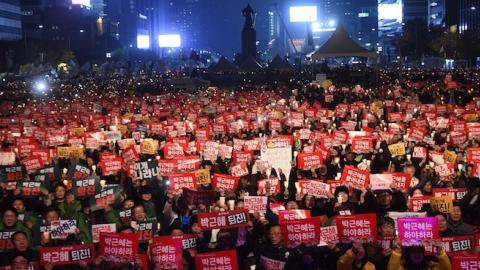Protests against South Korean President Park Geun-hye show no signs of abating, as her approval numbers plunge to record lows and parliament broaches the possibility of impeachment. And as the Financial Times notes, South Korea’s troubles go far beyond the President’s influence-peddling scandal:
South Korea is facing what experts call a “compounded crisis”. At a time of faltering economic growth, heightened geopolitical tensions and a series of high-profile corporate problems, the country has found itself leaderless and in disarray. “South Korea is in a state of total crisis,” says Moon Chung-in, a professor of political science at Yonsei University in Seoul. “We have intertwined political, geopolitical and economic crises … and no leadership to mend the fractures or drive society.”[…]
“I can’t remember a time more challenging than this,” says Jun Kwang-woo, a former head of the government’s Financial Services Commission. “Even before the story of the president was revealed, we had a combination of security crises and economic challenges. Now we have this political crisis, which includes the largest corporations.”
South Korea’s crisis is economic, political, institutional, social, and geopolitical. Its economy has stagnated after decades of blistering growth. Its political system is struggling with a massive influence peddling scandal that threatens to tie the country’s political system in knots for months. Institutionally, the chaebols, the giant companies that once nurtured Korea’s growth but now face stagnation in a world of crony capitalism and sleaze, seem too big to reform—and too unreformed to succeed. Socially, the country is deeply divided between winners and losers, conservatives and progressives, and rival regions. Geopolitically, North Korea is moving ahead with its nuclear program and continues to threaten its neighbors as it builds a new generation of missiles. China is breathing fire about Korea’s decision to go with the United States on an anti-missile system. Both the United States and China are talking about the need for protectionism even as Korea’s economy struggles to find global markets.
The next U.S. administration faces anything but calm waters in Asia. We must hope that the Trump transition team includes people who know South Korea and understand its importance to vital American interests in a dangerous world.















